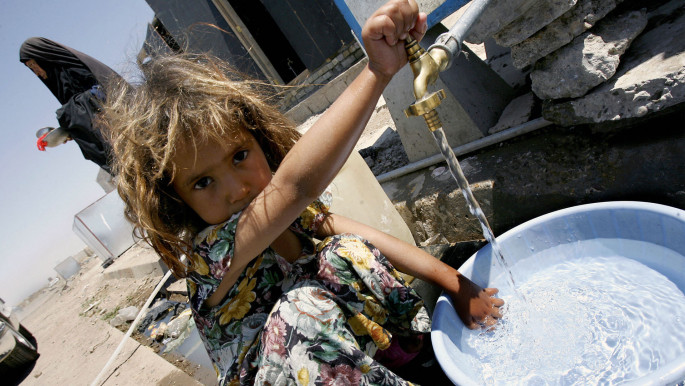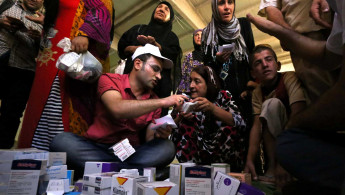Medicine in war: Killer drugs in Iraq
Voices rose. The atmosphere became heated inside the clinic of gastric specialist Dr Salem al-Rubaie, in the Harthiya district in central Baghdad. A patient was accusing the doctor of a misdiagnosis, of prescribing medicine that had caused complications. Eventually, Dr Rubaie's secretary and some patients had to step in to break up the verbal altercation before it became physical.
The two decided to ask a renowned local pharmacist to arbitrate. Alaa al-Saffar reviewed the doctor's prescription and the medicine the patient had bought from a pharmacy on the edge of the capital. His conclusion: The diagnosis was sound, but the medicine was counterfeit. The complications could have caused death with continued use.
Cheap and popular
| "We know that many shipments of medicine are tainted. That's why we charge so much" - border official |
Al-Araby al-Jadeed has been investigating Baghdad’s pharmaceutical market. The investigation has shown that cheap and low quality Indian, Chinese and Iranian drugs have flooded Iraqi pharmacies and are proving the most popular, according to the pharmacists and patients we spoke to. These are followed by Syrian, then Egyptian drugs, which occupy a middle position in terms of cost, popularity and effectiveness. The most effective – and most expensive – come from Saudi Arabia, the UAE, Britain and Germany.
The billion-dollar counterfeit drugs industry is big business, said Saffar, and is operated by a specialised mafia that works in organised rings. One ring starts by identifying the most popular pharmaceutical drugs in the market and sends samples to factories specialised in counterfeiting original products, mostly in China or India, to produce a desired quantity.
A second ring is charged with bringing the counterfeit products through Iraq’s borders. This is done either through straightforward smuggling or with the cooperation of individuals at border crossings. The drugs are then stored in warehouses in remote parts of Baghdad in preparation for their distribution to pharmacies.
The problem has knock-on effects, sometimes violent. Saffar said practitioners across the medical professions in Iraq face threats of kidnap and murder, in addition to being faced with the wrath of angry patients who have suffered the consequences.
Open borders for a price
To understand how counterfeit medicine is smuggled into Iraq, al-Araby al-Jadeed met with an Iraqi army officer who has been part of the force that secures the Traibil border crossing with Jordan for the past five years. The officer, who spoke on condition of anonymity, said the entry of counterfeit drugs into Iraq was aided by officials. “The Iraqi government and the ministry of health have complete knowledge that tainted drugs are coming through the borders,” he said. He blamed “the corruption that is prevalent in all government departments”.
The senior officer said corruption at Iraqi border crossings was the norm, not the exception.
“The majority of officers and those working at border crossings receive bribes. Some make close to $50,000 a month,” he said.
Border crossing staff and officers have been known pay their superiors to be assigned to such lucrative positions, he claimed.
“I paid a large amount to be moved to Traibil. I made that money back and then some in one year.”
The officer also admitted to allowing the entry of counterfeit drugs. “We know full well that many shipments of medicine are tainted or expired. That's why we charge so much for them to enter. And if I don't let them in, I'll be moved and replaced by someone else.”
Countermeasures
In order to limit the effects of this growing problem, Dr Rubaie now asks all his patients to return to him after purchasing medicine so he can examine their quality and expiry date. He showed al-Araby al-Jadeed examples of original and counterfeit drugs and asked us to spot the differences between them. To us, it proved nearly impossible. However, with his trained eye, Rubaie listed half a dozen differences in both the external and internal packaging.
Some steps are being taken to better inform the public. Dr Diyaa al-Abaiji is a scientific adviser to one of Iraq's largest pharmaceutical importers. He estimates the value of Iraq’s counterfeit drugs industry at $1 billion a year, or a fifth of all pharmaceutical sales in the country.
In a step deemed a first of its kind, Abaiji set up a well-received website dedicated to exposing counterfeit drugs by publishing pictures and simple information enabling consumers to identify fakes. However, Abaiji has been forced to dramatically change the way his website works after counterfeiters used it as a reference to improve the quality of their own products. Now, Abaiji communicates directly with patients via email rather than publishing the information online.
The law
 |
|
| Anbar suffers drug shortages [al-Araby al-Jadeed] |
Iraqi law includes firm penalties to deal with counterfeit drugs and imposter-pharmacists. Yet Iman al-Baldawi, a veteran lawyer with a career spanning more than 20 years, said she had never dealt with a single counterfeit-related case. In part, she said, this is because those affected cannot cope with lawyers' fees and legal proceedings that sometimes take months, and therefore prefer to accept financial settlements with pharmacies and doctors.
But the legislation is clear. Baldawi refers to article 50 of the medical practice penal code that punishes anyone “who counterfeits or reproduces pharmaceutical medicines, products or chemical substances, or sells them” with three years’ imprisonment and a fine.
The same penalty, in fact, applies to anyone “who sells tainted or expired medicine or chemical or biological products”, “manufactures a medicine or medical products without a license”; “practices pharmacology without a license or obtains a license to operate a pharmacy by deceit,” as well as “every pharmacist who allows a non-licensed person to practice the profession under his name”.
Jalil Hussain, the head of the Iraqi Association of Pharmacists, said the problem did not lie with official pharmacies, which deal with properly licensed companies that have quality control procedures. He accused “irregular” pharmacies, common in poor and isolated neighbourhoods, in addition to street vendors, as the biggest outlet for the distribution of counterfeit drugs.
Adnan Issa al-Bayati, a former civil servant at the ministry of health, disagrees. He believes that the root of the problem relates to the dramatic change that affected drug import and preparation procedures after the US-led invasion in 2003. Lax legislation brought in then paved the way for more than a hundred companies to import medicine, some of which even supply the ministry of health.
Chaos
But blame gets spread around. Abu Ahlam, a salesman for a company in the Mansour area of Baghdad, accused corrupt doctors of being more than partly to blame. These doctors, he said, receive regular commissions from drug companies to promote their products, regardless of the product's effectiveness or expiry date.
“Doctors used to request fixed commissions for the amount they promote among their patients, but more recently the requests have increased,” said Abu Ahlam, not his real name. Doctors’ demands have now, in some cases, reached to the point of the absurd. One ear, throat and nose specialist wanted the drug company to furnish his new house, Abu Ahlam claimed. One heart specialist allegedly demanded the company pick up the bill for a trip to London.
A colleague, who identified himself as a “scientific representative” at this Mansour-area company, said such doctors – whom he described as “nobodies” – would go to great lengths to present themselves as accomplished physicians. He cited the example of one doctor who hires a group of acting “extras” in his surgery, who pretend to be patients to promote the doctor among other patients. Such unscrupulous doctors, this colleague of Abu Ahlam added, would have little problem pushing counterfeit or suspiciously sourced medicine to their patients.
Troubled country
All this in Baghdad, which enjoys a relatively good supply of legitimate pharmaceuticals. Troubled provinces in Iraq suffer from a shortage of medicine, counterfeit or otherwise. Nasir al-Jumaili, an Anbar resident, said the problem was so bad there that residents are forced to brave the trip to Baghdad themselves or have drivers bring their medicine back. Anbar, Iraq’s largest province, is largely controlled by the Islamic State group (IS, formerly known as ISIS), which routed Iraqi security forces from huge swathes of territory in the province back in June.
Jumaili's account was confirmed by an official at a ministry of health medical warehouse, who refused to give his name.
“No one will risk their life to deliver medicine to Anbar province,” said the logistics official. “There is only one way to deliver medicine from Baghdad to Anbar, which is for the ministry of health to send the available medicines close to the province's border to be picked up by the Anbar health authority. The same goes for Mosul and wide areas of Saladin province, whose populations suffer from a lack of medicines.”



